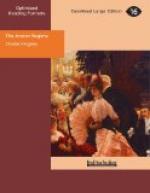Dividing, I say. The poor of the Middle Age had little sense of a common humanity. Those who owned allegiance to the lord in the next valley were not their brothers; and at their own lord’s bidding, they buckled on sword and slew the next lord’s men, with joyful heart and good conscience. Only now and then misery compressed them into masses; and they ran together, as sheep run together to face a dog. Some wholesale wrong made them aware that they were brothers, at least in the power of starving; and they joined in the cry which was heard, I believe, in Mecklenburg as late as 1790: “Den Edelman wille wi dodschlagen.” Then, in Wat Tyler’s insurrections, in Munster Anabaptisms, in Jacqueries, they proved themselves to be masses, if nothing better, striking for awhile, by the mere weight of numbers, blows terrible, though aimless—soon to be dispersed and slain in their turn by a disciplined and compact aristocracy. Yet not always dispersed, if they could find a leader; as the Polish nobles discovered to their cost in the middle of the seventeenth century. Then Bogdan the Cossack, a wild warrior, not without his sins, but having deserved well of James Sobieski and the Poles, found that the neighbouring noble’s steward had taken a fancy to his windmill and his farm upon the Dnieper. He was thrown into prison on a frivolous charge, and escaped to the Tatars, leaving his wife dishonoured, his house burnt, his infant lost in the flames, his eldest son scourged for protesting against the wrong. And he returned, at the head of an army of Tatars, Socinians, Greeks, or what not, to set free the serfs, and exterminate Jesuits, Jews, and nobles, throughout Podolia, Volhynia, Red Russia; to desecrate the altars of God, and slay his servants; to destroy the nobles by lingering tortures; to strip noble ladies and maidens, and hunt them to death with the whips of his Cossacks; and after defeating the nobles in battle after battle, to inaugurate an era of misery and anarchy from which Poland never recovered.
Thus did the masses of Southern Poland discover, for one generation at least, that they were not many things, but one thing; a class, capable of brotherhood and unity, though, alas! only of such as belongs to a pack of wolves. But such outbursts as this were rare exceptions. In general, feudalism kept the people divided, and therefore helpless. And as feudalism died out, and with it the personal self-respect and loyalty which were engendered by the old relations of master and servant, the division still remained; and the people, in France especially, became merely masses, a swarm of incoherent and disorganised things intent on the necessaries of daily bread, like mites crawling over each other in a cheese.
Out of this mass were struggling upwards perpetually, all who had a little ambition, a little scholarship, or a little money, endeavouring to become members of the middle class by obtaining a Government appointment. “A man,” says M. de Tocqueville, “endowed with some education and small means, thought it not decorous to die without having been a Government officer.” “Every man, according to his condition,” says a contemporary writer, “wants to be something by command of the king.”




